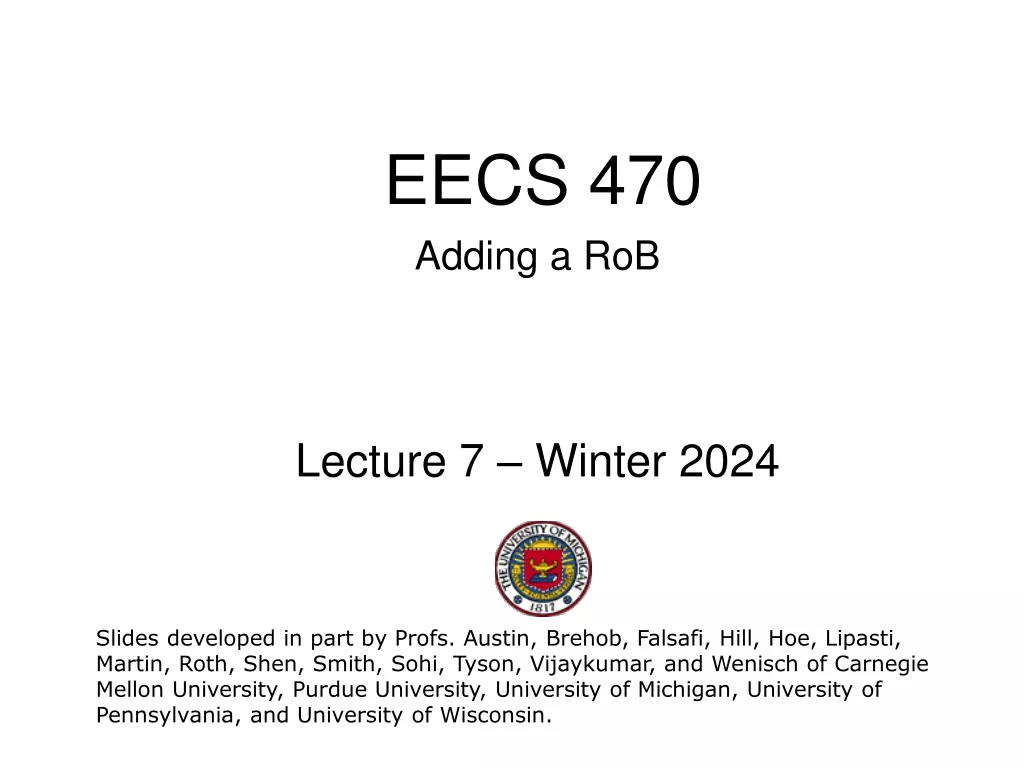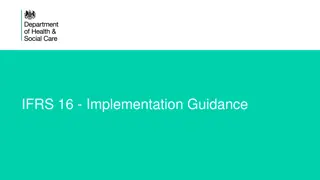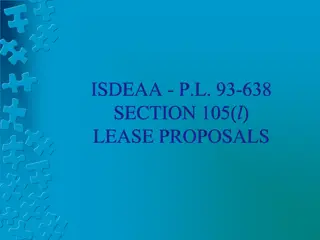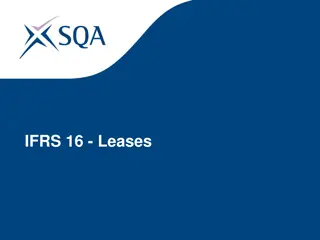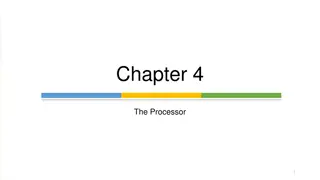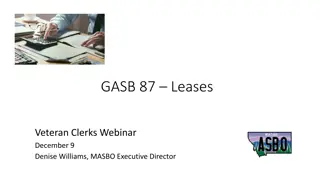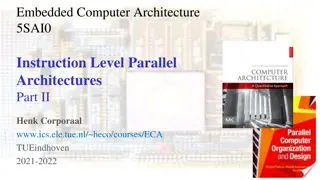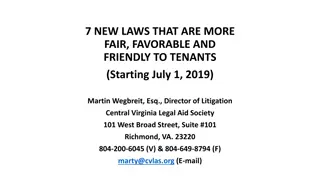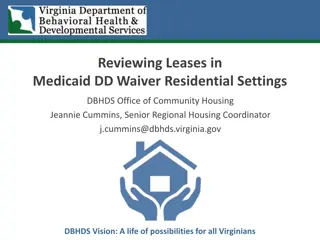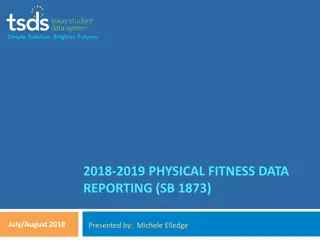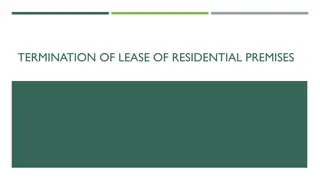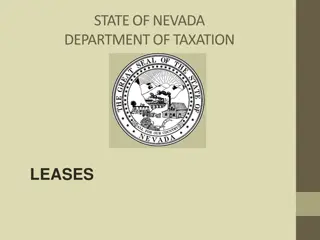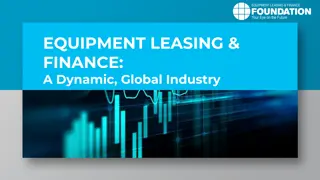The Impact of 1873 Railroad Speculation on Texas Leases
The late 19th century saw railroad speculators promise construction in Texas in exchange for state resources, leading to debts and unfulfilled projects by 1875-76. This history influenced the drafting of the 1876 Texas Constitution to regulate state debt and prevent repeating past mistakes.
Download Presentation

Please find below an Image/Link to download the presentation.
The content on the website is provided AS IS for your information and personal use only. It may not be sold, licensed, or shared on other websites without obtaining consent from the author.If you encounter any issues during the download, it is possible that the publisher has removed the file from their server.
You are allowed to download the files provided on this website for personal or commercial use, subject to the condition that they are used lawfully. All files are the property of their respective owners.
The content on the website is provided AS IS for your information and personal use only. It may not be sold, licensed, or shared on other websites without obtaining consent from the author.
E N D
Presentation Transcript
RAILROADS THE HOT NEW TECHNOLOGY AND THE FINANCIAL PANIC OF 1873 The American Civil War (1861-1865) was followed by a boom in railroad construction. 33,000 miles (53,000 km) of new track were laid across the country between 1868 and 1873. Much of the craze in railroad investment was driven by government land grants and subsidies to the railroads. At that time, the railroad industry was the nation's largest employer outside of agriculture, and it involved large amounts of money and risk. A large infusion of cash from speculators caused abnormal growth in the industry as well as overbuilding of docks, factories and ancillary facilities. At the same time, too much capital was involved in projects offering no immediate or early returns. Panic of 1873 Wikipedia For other background information, see: U.S. Department of the Treasury Financial Panic of 1873
SO, HOW DO THESE EVENTS FROM THE LATE 19THCENTURY AFFECT LEASES WITH THE STATE OF TEXAS TODAY? Numerous - what we would now call entrepreneurs, but were then called speculators, wheeler-dealers, and other less favorable names, had come to Texas, promised the construction of railroads in return for state money, land and debt In many instances state leaders handed over money, land and assumed debt for the to-be-built railroads, which railroads, in many instances, had not appeared by 1875-76 The drafters of the Texas Constitution of 1876 had a strong desire for state government not to repeat this process
HENCE, THE TEXAS CONSTITUTION HAS ARTICLE III - SECTIONS 49, 50, 51 AND 55 Sec. 49. STATE DEBTS. No debt shall be created by or on behalf of the State, except: There is a lengthy list of exceptions, but this establishes the pay as you go system Sec. 50. LOAN OR PLEDGE OF CREDIT OF THE STATE. The Legislature shall have no power to give or to lend, or to authorize the giving or lending, of the credit of the State in aid of, or to any person, association or corporation, whether municipal or other, or to pledge the credit of the State in any manner whatsoever, for the payment of the liabilities, present or prospective, of any individual, association of individuals, municipal or other corporation whatsoever. (This section now has a large number of exceptions)
TEXAS CONSTITUTION (CONTINUED) Sec. 51. GRANTS OF PUBLIC MONEY PROHIBITED. The Legislature shall have no power to make any grant or authorize the making of any grant of public moneys to any individual, association of individuals, municipal or other corporations whatsoever; provided that the provisions of this Section shall not be construed so as to prevent the grant of aid in cases of public calamity. Sec. 55. RELEASE OR EXTINGUISHMENT OF INDEBTEDNESS TO STATE, COUNTY, SUBDIVISION, OR MUNICIPAL CORPORATION. The Legislature shall have no power to release or extinguish, or to authorize the releasing or extinguishing, in whole or in part, the indebtedness, liability or obligation of any corporation or individual, to this State or to any county or defined subdivision thereof, or other municipal corporation therein, except delinquent taxes which have been due for a period of at least ten years.
WHAT DOES THIS DO TO A STATE REAL ESTATE MANAGER? Virtually all leases contain indemnities the indemnities come in two forms - Ordinary and Express Negligence Ordinary - a party agrees to be responsible for its actions or inactions; no real expansion of liability here since the law generally will make a party bear some responsibility for its actions ( harmless surplusage as characterized in State Attorney General opinions) Express a party agrees to be responsible for another party s actions or inactions, generally in this context a Landlord; essentially you agree to become an insurance company. The State can t do that
INDEMNITIES IN LEASES Texas Attorney General Opinion MW-475 (1982): To the extent that such [an indemnity] clause merely reinforces obligations the university has legally undertaken elsewhere, and does not expand or increases the school s liability or the scope of its liability, it is harmless surplusage. But to the extent that it purports to create liability or potential liability on the part of the university beyond its statutory or constitutional powers to incur liability, it is invalid. The governing bodies of state universities are creatures of statute and may constitutionally exercise only powers properly delegated to them by the legislature. See Foley v. Benedict, 55 S.W.2d 805 (Tex. 1932). A contractually imposed obligation of indemnity creates a "debt" in the constitutional sense unless at the time of the agreement it is within the lawful and reasonable contemplation of the parties that it will be satisfied out of current revenues or some currently available fund. Tex. Const. art. III, 49. art. XI, 5, 7; T & N.O.R.R. Company v. Galveston County, 169 S.W.2d 713~ (Tex. 1943) We think it continues to be the law in this state that the State of Texas cannot be held liable for a contractual obligation concluded by an agent of the state in excess of his authority, and that no state agent can be given authority to incur or create a debt on behalf of the state in contravention of the constitution. See City of Wichita Palls v. Kemp Public Library Board of Trustees, 593 S.W.2d 834 (Tex. Civ. App. - Fort Worth 1980, writ ref'd n.r.e.).
SO, HOW DO WE RESPOND TO THESE PROVISIONS IN A MANNER CONSISTENT WITH THE STATE CONSTITUTION IN LEASES? Waivers, releases and indemnities will receive special scrutiny As the Attorney General opinion MW-475 says, if there is no expansion of liability it may be harmless surplusage , but if it is more, it s probably unenforceable To the extent authorized by the Constitution and laws of the State of Texas is a common addition to these types of provisions Individual circumstances are fact driven and difficult to predict, but attempted risk shifting to the State, if challenged in court, may well be unsuccessful
SO, WHATS AN INDEMNITY GOOD FOR? In my trial experience, an indemnity (written or common law) allowed me to file cross-actions against my co-defendants alleging that they bore all or at least part of the responsibility for whatever had allegedly gone wrong Then, when settlement time came, all of the defendants would get the opportunity to contribute to the settlement (the Sears case in the early 1980s, which in this case was good for a great story)
SO, WHAT DOES THE STATE LAW ADDENDUM SAY? 3.Indemnities. Pursuant to Article III, Sections 49, 50, 51, 55 and the other applicable provisions of the Texas Constitution, no provision of this Agreement and the Ancillary Agreements providing that BOR will reimburse, indemnify or hold harmless Owner or any other person for any liability, claim or damages that are not caused by the negligent or willful acts or omissions of BOR shall be of force and effect. So, the Landlord or other party should not expect its indemnities to be generally enforceable
WHAT ABOUT ATTORNEYS FEES? Leases commonly include provisions for attorney s fees Contractual provisions seeking to impose the obligation to pay attorney s fees on governmental entities likewise run afoul of Article III, section 51, of the Texas constitution. [T]he State is immune from liability for attorney s fees except when that immunity is waived by clear statutory language. Tex. Dept. of Human Services v. Methodist Retirement Services, Inc., 763 S.W.2d 613, 614 (Tex. App. Austin 1989); State of Texas v. Bodisch, 775 S.W.2d 73, 76 (Tex. App. Austin, 1989). In the Methodist Retirement Services case, the appellee prevailed in its primary claim against the State under the Medicaid program. The State only appealed the trial court s award of attorney s fees. The appellate court granted the State its requested relief and entered a take nothing judgment for the attorney s fees claim.
ATTORNEYS FEES MAY OR MAY NOT BE AN ISSUE WITH YOUR INSTITUTION A LOT OF TIME YOUR LEGAL SERVICES ARE FREE Free? Not really, but the cost isn t readily evident Leases commonly include provisions that the winning party in a dispute will be paid their legal fees by the losing party. This is intended to discourage disputes In my experience with personal injury defense matters, attorney s fees are hard to get (L.R. French v. Diamond-Hill Jarvis Civic League)
WHAT ABOUT A LEASE FROM THE STATE AT A BELOW MARKET RATE? Attorney General Opinion MW-373 addressed a situation where The University of Texas Law School proposed to provide office space, utilities and staff assistance to The University of Texas Law School Foundation rent-free. The opinion at page 1255 states: Article III, section 51 of the constitution requires that a grant by the university to the foundation must serve a public purpose, appropriate to the function of a university, and that adequate consideration must flow to the public. [Citations omitted.] In addition, the university must maintain some controls over the foundation s activities, to ensure that the public purpose is actually achieved. [Citations omitted.] If these conditions are met, the grant by the public entity is not unconstitutional.
CONSTITUTIONALLY THE STATE NEEDS TO GET FAIR MARKET VALUE OR SATISFY THE 3 PRONGS OF AG OPINION MW-373 A state lease for below market rent must: Be for a public purpose as determined by the governing body of the state agency making the lease Adequate (non-monetary) consideration must flow to the state for the lease, typically because the third-party lessee performs a function that supports the mission of the state agency granting the lease Adequate controls to ensure the continued performance of the supporting function must exist in favor of the state; we commonly provide that the lease reverts to fair market value if the supporting function is no longer performed
WHY IS THE REAL ESTATE OFFICE ALWAYS HARPING ON APPRAISALS AND EVIDENCE OF FAIR MARKET VALUE? It s this constitutional thing that drives these inquiries Yes, we realize that these appraisals cost money and your time, which time is frequently committed to more matters than can be readily handled But, auditors can and do grade all of our papers and we d like generally to get a passing grade I ve told you the Oregon Duck story, but I ll repeat it Some people with whom you deal may be of the opinion that State assets are essentially free or at least heavily discounted you ll need to counter those thoughts
TEXAS GOVERNMENT CODE SECTION 2167 The Texas Facilities Commission has authority to lease space for state agencies subject to delegated authority to other state agencies Sec. 2167.052. LEASING SPACE FROM PRIVATE SOURCE (a) Space may be leased from a private source through: (1) competitive bidding; (2) competitive sealed proposals under Section 2167.054; or (3) direct negotiation. (b) The commission may negotiate for space on making a written determination that competition is not available. (c) The commission shall use the method for leasing space that provides the best value [emphasis supplied] for the state.
SO, WHAT HAS THE REAL ESTATE OFFICE DONE TO TRY TO HELP YOU AND YOUR INSTITUTIONS WITH YOUR LEASING? We went through an RFP process for the greater Houston area so any UT institution that wished to lease space had a list of approved Real Estate firms to use We re trying this process out, but it s proving to be more bureaucratic from the institutional perspective and time consuming from the REO standpoint than I expected REO has lost two lawyers that it hasn t been able to replace, but we have been permitted to retain outside counsel to assist REO and your institutions, which has been very helpful
ARBITRATION Leases commonly include arbitration provisions Pursuant to Texas Government Code Section 2009.005(c), a provision providing for the arbitration of disputes is of no force and effect, so no can do Non-binding arbitration and mediation is permitted. Chapter 154, Texas Civil Practice and Remedies Code
INSURANCE This is special Sovereign Immunity; if interested Daniel T. Murphy in 1968 published, The American Doctrine of Sovereign Immunity: An Historical Analysis in the Villanova Law Review now found at digitalcommonslaw.villanova.edu, which references some cases involving ships seized on the high seas allegedly by various governments The Texas constitution envisions a limited government and sovereign immunity remains a viable doctrine in Texas jurisprudence. Texas Government Code Section 2009.005 State agencies may only acquire insurance to the extent they are authorized to do so by state law
MORE INSURANCE A governmental unit is immune from suit and liability unless the State, through the Legislature, consents to the suit. Dallas Area Rapid Transit v. Whitley, 104 S.W.3d 540,542 (Tex. 2003). Legislative consent to suit, whether expressed by stature or otherwise, must be given in clear and unambiguous language. Tex. Gov t Code Section 311.03; University of Texas Medical Branch v. York, 871 S.W.2d 175, 177 (Tex. 1994). The Texas Tort Claims Act, Chapter 101 of the Texas Civil Practice and Remedies Code, provides a limited waiver of the doctrine of sovereign immunity Workers Comp is provided pursuant to Texas Labor Code, Chapter 503
PRACTICALLY SPEAKING, HOW DOES SYSTEMS APPROACH TO INSURANCE AFFECT YOU? Your institutions are subject to Sovereign Immunity, the Texas Tort Claims Act and other laws that limit claims against the State, which include your institutions as State agencies System has a comprehensive insurance program providing various coverages for claims against your institutions, of which a significant component is self-insurance Self-insurance, to my way of thinking, consists of two types: real big deductibles or, what are called captive insurance companies, frequently founded and headquartered in Bermuda UT System has the first type real big deductibles
THIS IS HOW THE STATE LAW ADDENDUM HANDLES INSURANCE 8. Insurance. Owner acknowledges that BOR is an agency of the State of Texas and has only such authority as is granted to BOR by state law or as may be reasonably implied from such law, and that any obligation of BOR under this Agreement or any Ancillary Agreement to obtain insurance is expressly made subject to the BOR s authority under state law to obtain such insurance. Owner further agrees that BOR shall have the right, at its option, to (a) obtain liability insurance protecting BOR and its employees and property insurance protecting BOR s interests in real property and the contents located in such real property, to the extent authorized by Section 51.966 of the Texas Education Code or other law; or (b) self-insure against any risk that may be incurred by BOR as a result of its operations under this Agreement or any Ancillary Agreement. The TexDOT story
CONFIDENTIAL INFORMATION Sometimes in leases the non-state party will want a provision stating that certain information will be kept confidential The Texas Public Information Act makes these sorts of provisions of questionable practical enforceability, when the State is the other party Generally, language is added that the State must strictly comply with the Texas Public Information Act and Attorney-General opinions interpreting the Act I generally advise other parties that, once a lease is signed, I make no promises that information given in connection with the lease can be kept confidential
THIS IS HOW THE STATE LAW ADDENDUM HANDLES CONFIDENTIALITY 10. Public Information Act. Any obligation of BOR under the Agreement or any Ancillary Agreement to (i) keep the terms and provisions of the Agreement or such Ancillary Agreements confidential; and/or (ii) not disclose the financial terms of this Agreement or such Ancillary Agreement, shall be binding on BOR only to the extent permitted by law, including without limitation Chapter 552 of the Texas Government Code (commonly known as the Texas Public Information Act) or any successor law or other similar statutory provisions. I understand from our intellectual property lawyers that the State may be able to give a little more third-party protection with IP
ACCESSIBILITY Premises leased by the State must comply with Texas Government Code Chapter 469 for accessibility by persons covered by such act If the premises do not comply and are not brought into compliance, then Chapter 469 requires termination of the lease and release of further liability of the State under the lease A provision may be added to the lease requiring the landlord to cooperate with the State in the review of the premises If the premises are being built out by the State, then compliance with Chapter 469 within the premises may be undertaken by the State, but outside the premises, the landlord should cause compliance
THE TAS REQUIREMENT IS FUNDAMENTALLY ABSOLUTE, SO YOUR INSTITUTION MUST COMPLY Your institutions must review space that they lease for their use for compliance with TAS My experience with TAS compliance at the plans and inspection of completed construction discuss process You can have complaints Get the review done depending on the nature of the leased space, your institution may have to take responsibility for some issues and the landlord may have to take responsibility for others Section 11 of the State Law Addendum addresses this issue
1295 CERTIFICATES If a lease involves the expenditure of $1,000,000 or more, or requires action by the governing board of the state agency before it may be entered into, then the other party, acting as landlord or tenant, must file a Form 1295 with the Texas Ethics Commission - Texas Government Code Section 2252.908 This form identifies the interested parties, who own or control the landlord or tenant with which the State is contracting, and other parties with a financial interest in the lease If a form 1295 is required, the state agency lacks power to sign the lease until it has evidence that the form has been filed
NEVER FORGET, WHEN YOURE LEASING, SOMETIMES THINGS GO WRONG
SUMMARY As a practical matter, the State can do most things that private sector parties can do; but there can be some special hoops to jump through Indemnities get more attention than I think they generally deserve The way the State approaches insurance differs somewhat from the private sector Authority to sign leases is generally reserved at a fairly high level and the private sector is deemed to know the authority of the governmental persons with whom they deal At The University of Texas System, we deal with a lot of this through our State Law Addendum, which we can attach to, or refer to, in leases There s more, but that s all the time I ve got and I thank you for your time


